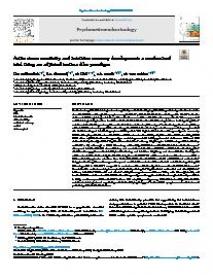Acute stress reactivity and intrusive memory development : a randomized trial using an adjusted trauma film paradigm
Understanding the neurobiological and cognitive processes underlying the development of posttraumatic stress disorder (PTSD) and its specific symptoms may facilitate preventive intervention development. Severe traumatic stress and resulting biological stress system activations can alter contextual memory processes. This may provide a neurobiological explanation for the occurrence of intrusive memories following trauma. Investigating the associations between temporal aspects and individual variation in peri- and post-traumatic hypothalamic pituitary adrenal (HPA) axis and sympathetic nervous system (SNS) stress reactivity and memory processing may increase our understanding of intrusive symptom development. The experimental trauma film paradigm is commonly used for this purpose but lacks robust SNS and HPA axis activation. Here, we performed an RCT to investigate the effect of an adjusted trauma film paradigm containing an added brief psychosocial stressor on HPA and SNS stress reactivity throughout the experiment and intrusive memory frequency in the following week in healthy males (N = 63, mean age = 22.3). Secondary, we investigated effects on film-related declarative memory accuracy and intrusion-related characteristics, and associations between acute HPA and SNS stress reactivity, filmrelated memory, glucocorticoid receptor functioning and intrusion frequency and characteristics.
Participants were randomized to the socially-evaluated cold pressor test (seCPT n = 29) or control condition (warm water n = 34) immediately prior to a trauma film. Linear Mixed Models revealed increased acute SNS and cortisol reactivity, lower recognition memory accuracy and more intrusions that were more vivid and distressing during the following week in the seCPT compared to control condition. Linear regression models revealed initial associations between cortisol and alpha amylase reactivity during the experimental assessment and subsequent intrusions, but these effects did not survive multiple comparison corrections. Thus, with this adjustment, we increased the translational value of the trauma film paradigm as it appears to elicit a stronger stress response that is likely more comparable to real-life trauma. The adapted paradigm may be useful to investigate individual variation in biological and cognitive processes underlying early post-trauma PTSD symptoms and could advance potential preventive interventions.
In: Psychoneuroendocrinology ; ISSN: 0306-4530 | 139 | May | 105686
https://doi.org/10.1016/j.psyneuen.2022.105686


